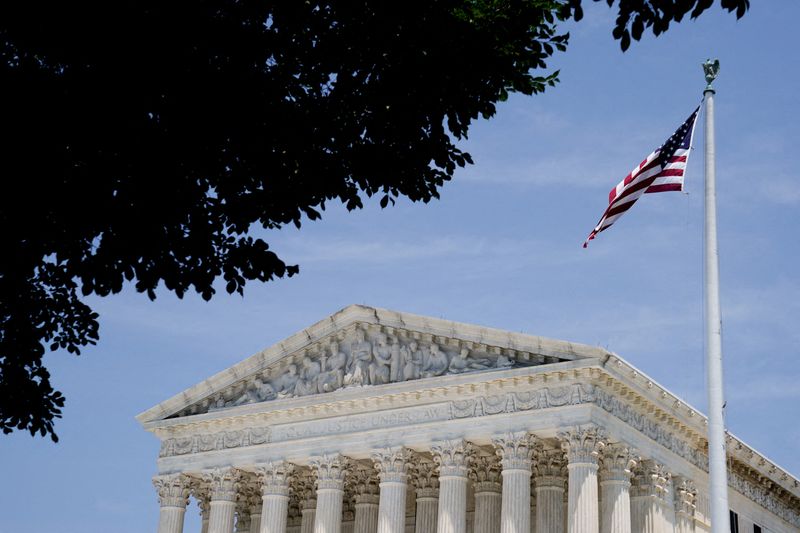By Andrew Chung
(Reuters) -The U.S. Supreme Court on Monday dismissed a Republican bid to defend a Louisiana electoral map that was challenged as discriminatory in a case that could lead to the creation of a second majority-Black congressional district in the state.
The justices dismissed the appeal by Louisiana Secretary of State Kyle Ardoin of a federal judge’s decision that the map delineating Louisiana’s six U.S. House of Representatives districts drawn by the Republican-led state legislature likely discriminated unlawfully based on race.
The justices had taken up the case last year but put it on hold awaiting their ruling in a similar case from Alabama, which they issued on June 8.
U.S. Judge Shelly Dick had directed Louisiana’s legislature to create two House districts, rather than just one, where Black voters would represent the majority of voters, a decision that could boost Democratic chances of regaining control of the House in next year’s congressional elections.
In their brief order dismissing the case “as improvidently granted,” they justices said that their action will allow the matter to proceed before the New Orleans-based 5th U.S. Circuit Court of Appeals “for review in the ordinary course and in advance of the 2024 congressional elections in Louisiana.”
The justices also lifted their previous order that had blocked Dick’s decision in favor of the plaintiffs, allowing litigation to continue over a replacement map.
“We feel very confident about our likelihood of success,” Abha Khanna, an attorney for some of the plaintiffs, said in an interview.
The office of Louisiana Attorney General Jeff Landry, a Republican, vowed to press an appeal at the 5th Circuit.
“Our job is to defend what the legislature passed, and we trust the 5th Circuit will review the merits in accordance with the law,” Assistant Attorney General Angelique Freel said.
A spokesperson for Ardoin’s office declined to comment.
Electoral districts in the United States are redrawn each decade to reflect population changes as measured by a national census, last taken in 2020. In most states, such redistricting is done by the party in power, which can lead to map manipulation for partisan gain.
Democrats have accused Republicans of exploiting state legislature majorities to draw electoral maps that dilute the clout of Black and other minority voters. Republicans have said the consideration of race in drawing electoral maps must be limited.
The Louisiana legislature passed the map in February 2022. Democratic Governor Jon Bel Edwards then vetoed it, criticizing the plan for failing to include a second Black-majority district considering that Black voters comprise almost a third of the state’s population. The legislature voted to override the veto.
The map was challenged by Black voters and civil rights groups in two lawsuits. The plaintiffs said the Republican-drawn unlawfully packed large numbers of Black voters into a single district and dispersed the rest into the five others in numbers too small to enable them to elect their preferred candidates.
One of the lawsuits said the Republican-drawn map “continues the State of Louisiana’s long history of maximizing political power for white citizens by disenfranchising and discriminating against Black Louisianans.”
The plaintiffs in court papers said that “stark racially polarized voting almost universally leads to the electoral defeat of Black-preferred candidates” in Louisiana.
Dick ruled that the way the map was drawn by the Republicans likely violated the Voting Rights Act, which for decades has been used to counter racially biased actions in voting and drawing electoral districts.
The U.S. Supreme Court ruled on June 8 in the Alabama case, with two conservative justices joining the three liberals in the majority. They affirmed a lower court’s decision that the Republican-drawn map of that state’s seven House districts diminished the voting power of Black Alabamians in violation of the Voting Rights Act.
(Reporting by Andrew Chung in New York; Editing by Will Dunham)
